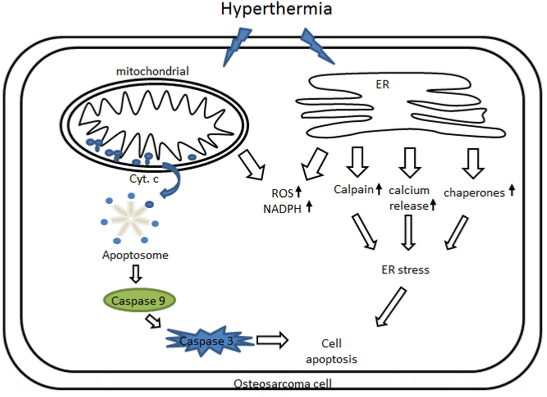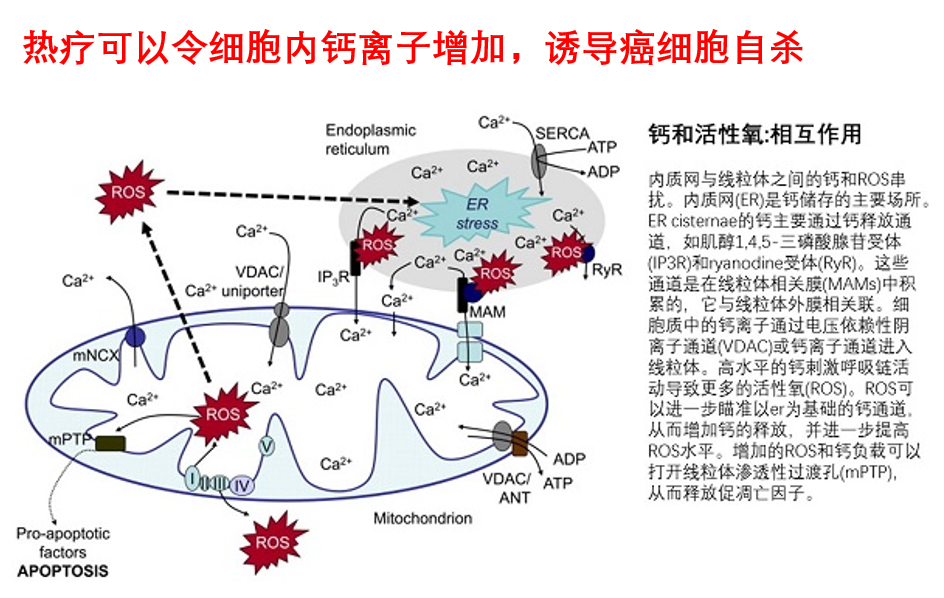热疗可以令细胞内钙离子增加,诱导癌细胞自杀
Hyperthermia Induces Apoptosis through Endoplasmic Reticulum and Reactive Oxygen Species in Human Osteosarcoma Cells
骨肉瘤(OS)是一种相对少见的癌症,但骨肉瘤是儿童和青少年中最常见的诊断性骨癌。化疗有副作用,在骨肉瘤治疗中诱发耐药。由于有效的辅助治疗不足以治疗骨肉瘤,因此研究新的和适当的治疗方法是至关重要的。
热疗 (Hyperthemia)可以诱导多种癌细胞的细胞死亡,因此,在本研究中,我们研究了对人类骨肉瘤细胞( U-2 OS) 的热疗抗癌方法。治疗43°C 60分钟诱导骨肉瘤细胞的凋亡, 而主要的骨细胞不受影响。此外,热疗与细胞内活性氧(ROS)的增加和U-2 OS细胞的caspase-3活化有关。

线粒体功能障碍伴随线粒体释放细胞色素c、抗凋亡Bcl-2和Bcl-xL的降低,和促凋亡蛋白Bak和Bax的增加。热疗引起内质网应激,其特点是细胞质中钙含量的变化,同时也增加了calpain的表达和活性。此外,用钙螯合剂(BAPTA-AM)治疗阻断了高热在人类骨肉瘤细胞(U-2 OS)中诱导的细胞凋亡。综上所述,通过ROS、ER应激、线粒体和caspase通路,热疗诱导细胞凋亡。因此,热疗可能是一种新的治疗骨肉瘤的抗癌方法。
https://s.click.taobao.com/hYsTINw
Hyperthermia Induces Apoptosis through Endoplasmic Reticulum and Reactive Oxygen Species in Human Osteosarcoma Cells
Osteosarcoma (OS) is a relatively rare form of cancer, but OS is the most commonly diagnosed bone cancer in children and adolescents. Chemotherapy has side effects and induces drug resistance in OS. Since an effective adjuvant therapy was insufficient for treating OS, researching novel and adequate remedies is critical.
Hyperthermia can induce cell death in various cancer cells, and thus, in this study, we investigated the anticancer method of hyperthermia in human OS (U-2 OS) cells. Treatment at 43 °C for 60 min induced apoptosis in human OS cell lines, but not in primary bone cells. Furthermore, hyperthermia was associated with increases of intracellular reactive oxygen species (ROS) and caspase-3 activation in U-2 OS cells.
Mitochondrial dysfunction was followed by the release of cytochrome c from the mitochondria, and was accompanied by decreased anti-apoptotic Bcl-2 and Bcl-xL, and increased pro-apoptotic proteins Bak and Bax. Hyperthermia triggered endoplasmic reticulum (ER) stress, which was characterized by changes in cytosolic calcium levels, as well as increased calpain expression and activity.
In addition, cells treated with calcium chelator (BAPTA-AM) blocked hyperthermia-induced cell apoptosis in U-2 OS cells. In conclusion, hyperthermia induced cell apoptosis substantially via the ROS, ER stress, mitochondria, and caspase pathways. Thus, hyperthermia may be a novel anticancer method for treating OS.
.png)

.png)
.png)